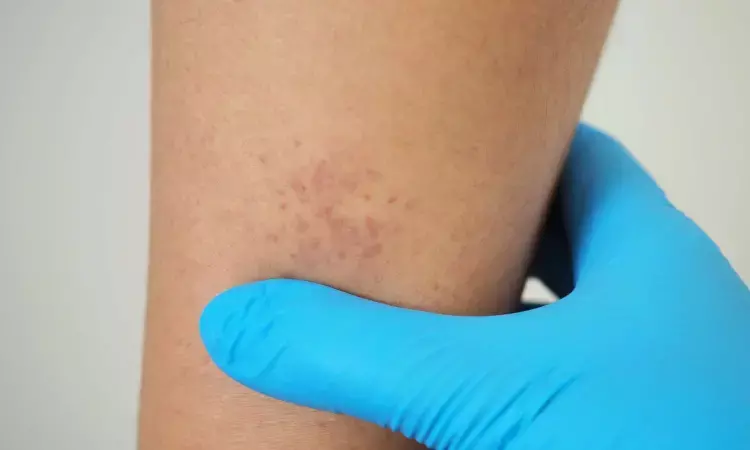- Home
- Medical news & Guidelines
- Anesthesiology
- Cardiology and CTVS
- Critical Care
- Dentistry
- Dermatology
- Diabetes and Endocrinology
- ENT
- Gastroenterology
- Medicine
- Nephrology
- Neurology
- Obstretics-Gynaecology
- Oncology
- Ophthalmology
- Orthopaedics
- Pediatrics-Neonatology
- Psychiatry
- Pulmonology
- Radiology
- Surgery
- Urology
- Laboratory Medicine
- Diet
- Nursing
- Paramedical
- Physiotherapy
- Health news
- Fact Check
- Bone Health Fact Check
- Brain Health Fact Check
- Cancer Related Fact Check
- Child Care Fact Check
- Dental and oral health fact check
- Diabetes and metabolic health fact check
- Diet and Nutrition Fact Check
- Eye and ENT Care Fact Check
- Fitness fact check
- Gut health fact check
- Heart health fact check
- Kidney health fact check
- Medical education fact check
- Men's health fact check
- Respiratory fact check
- Skin and hair care fact check
- Vaccine and Immunization fact check
- Women's health fact check
- AYUSH
- State News
- Andaman and Nicobar Islands
- Andhra Pradesh
- Arunachal Pradesh
- Assam
- Bihar
- Chandigarh
- Chattisgarh
- Dadra and Nagar Haveli
- Daman and Diu
- Delhi
- Goa
- Gujarat
- Haryana
- Himachal Pradesh
- Jammu & Kashmir
- Jharkhand
- Karnataka
- Kerala
- Ladakh
- Lakshadweep
- Madhya Pradesh
- Maharashtra
- Manipur
- Meghalaya
- Mizoram
- Nagaland
- Odisha
- Puducherry
- Punjab
- Rajasthan
- Sikkim
- Tamil Nadu
- Telangana
- Tripura
- Uttar Pradesh
- Uttrakhand
- West Bengal
- Medical Education
- Industry
Vitamin D supplementation improves treatment response in children with chronic immune thrombocytopenia

Egypt: A recent study published in Annals of Hematology has suggested vitamin D supplementation as a new therapeutic option for children with chronic immune thrombocytopenia (ITP).
The study showed sufficient vitamin D was tied to less disease severity and better treatment response.
Primary immune thrombocytopenia is an autoimmune disorder characterized by isolated thrombocytopenia without other conditions. It occurs when the immune system attacks and destroys healthy platelets. A person with ITP is more likely to bruise or bleed. Thrombocytopenia implies low platelets, a type of blood cell that helps with blood clotting. This happens when someone has another autoimmune disease, a viral infection, or certain cancers. It can also occur due to certain medications. ITP can develop in patients of all ages but is most common in children and older adults.
Vitamin D (VD) has been demonstrated to modulate the immune system, and its deficiency is associated with many immunological disorders. Vitamin D supplementation in immune thrombocytopenia has shown promising results.
Against the above background, Suzy Abd El Mabood, Mansoura University, Mansoura, Egypt, and colleagues aimed to evaluate the values of vitamin D in children with persistent and chronic ITP and the effects of its deficiency on treatment response and disease severity.
For this purpose, the researchers conducted a case-control study comprising 50 persistent and chronic ITP patients and 50 healthy controls. ELISA technique was deployed to determine 25 OH vitamin D levels.
The study revealed the following findings:
- VD median value was remarkably higher among the control group than the patients' group (28 versus 21.5).
- A severe deficiency was detected remarkably more among the patients' group than in the control group (24% vs 6%), respectively.
- Forty-four percent of complete responders belong to the sufficient VD category ((15/34) ~ 44%), representing all patients with sufficient VD status (n = 15).
- A positive correlation was observed between serum vitamin D and mean PLT count (r = 0.316).
"Our findings show that sufficient vitamin D may lead to better treatment response and less disease severity," the researchers wrote. "Vitamin D supplementation may be a new treatment option for children with chronic ITP."
Reference:
Mabrouk, R.E., Hussein, D.T., Abbas, M.E.E.R. et al. Sufficient vitamin D is favorable for children with persistent and chronic immune thrombocytopenia. Ann Hematol (2023). https://doi.org/10.1007/s00277-023-05210-9
Dr Kamal Kant Kohli-MBBS, DTCD- a chest specialist with more than 30 years of practice and a flair for writing clinical articles, Dr Kamal Kant Kohli joined Medical Dialogues as a Chief Editor of Medical News. Besides writing articles, as an editor, he proofreads and verifies all the medical content published on Medical Dialogues including those coming from journals, studies,medical conferences,guidelines etc. Email: drkohli@medicaldialogues.in. Contact no. 011-43720751


